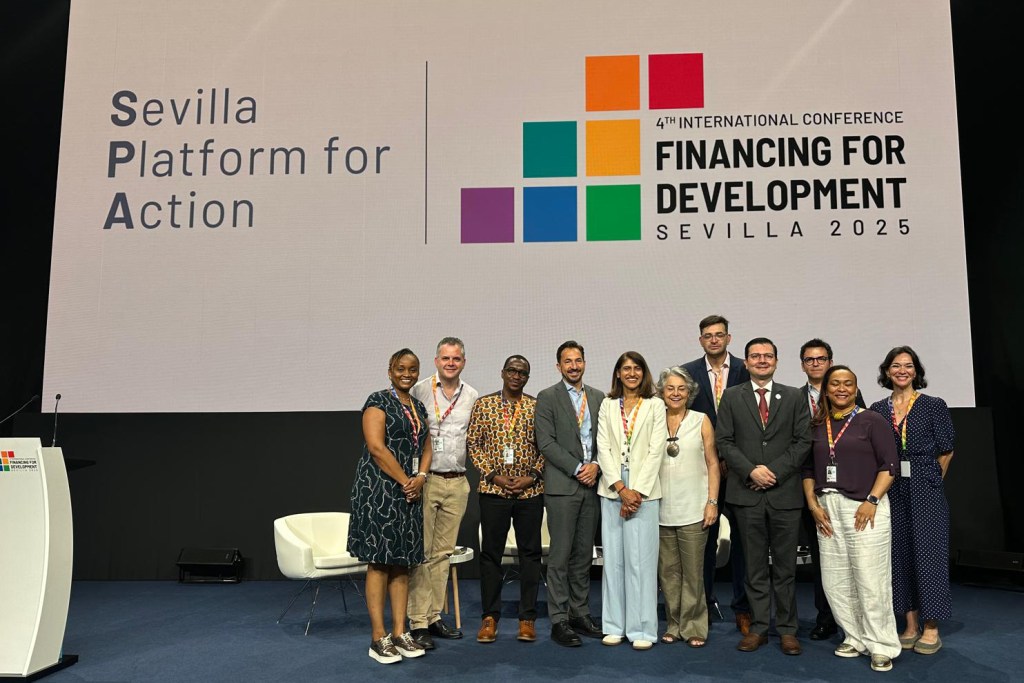
The dominant image of the role of financing in international cooperation is one of wealthy nations generously helping less wealthy ones by providing the funding to run schools, treat diseases, and build infrastructure. That frame has masked a more complex reality and faces growing challenges, with criticism of outdated income categories and power imbalances leading to Global North countries dictating the financial destiny of Global South ones.
The traditional frame of development finance has not been able to galvanize the level and type of resources needed to tackle shared global challenges. In 2023, only five countries met the UN’s Official Development Assistance (ODA) target of 0.7% of gross national income. Countries with limited resources have resorted to borrowing money at high costs, resulting in many countries spending significant amounts paying down their sovereign debt with scarce domestic resources: Over three billion people live in countries that spend more on repaying interest than on health, education, or other national development priorities.
With the status quo not working, innovation is essential. Global Public Investment is a vital part of the answer to how financing can meet the needs of our new era.
It is a model for addressing global challenges that no nation can tackle alone, including pandemic mitigation, crisis response, and access to green technology in the face of climate change. It champions a system in which all countries benefit, all countries contribute based on their capacity, and all countries have a say. Funds are allocated democratically based on need, prioritizing local impact that also generates global benefits, reframing international finance as a mutually beneficial investment and collaborative decision-making process rather than a top-down one. GPI will increase concessional funding—essentially, grant money—for global collaborations. It will also have the effect of freeing up other forms of assistance like ODA to be targeted toward some of the lowest-income countries for development programming.
Learn more about Global South Architects
“It’s about mutual benefits,” explained Harpinder Collacott, interim executive director of Global Public Investment Network (GPIN), an international coalition of nearly 100 civil society organizations, academics, governments, and experts committed to creating a more equitable international finance system. “Whether you’re a citizen from a rich country or poor country, the investments that are made will have benefits for every single human being. It’s collective action for collective good. GPI seeks to modernize global cooperation based on mutual interest, as opposed to the traditional charity model of the rich giving to the poor for impact in only one location.”
GPIN promotes a collaborative, inclusive funding model where communities have a voice in decisions. GPIN’s network of partners works directly with historically underrepresented communities to amplify their voices in shaping the future of global finance.
GPI recognises that international public money is a permanent force for good, rather than a temporary last resort. The model is being brought to international fora, including the United Nations General Assembly (UNGA), in order to further hone technical and policy solutions. The network is working to bring about pilots of at least two issues to be addressed through global public investment by 2029, and then to secure full integration of the approach into global financing structures. Towards this end, they will launch a coalition of governments at UNGA 2025 who are backing the initiative and who will shape the design of the pilots to build global public investment which works for all.
“The current multilateral system has two major weaknesses that GPI addresses: who participates and who has a voice in decision-making,” said Collacott. “Leaders can build systems which are inclusive and equitable, where all contribute, all benefit, and all decide. Global Public Investment is how they can.”
